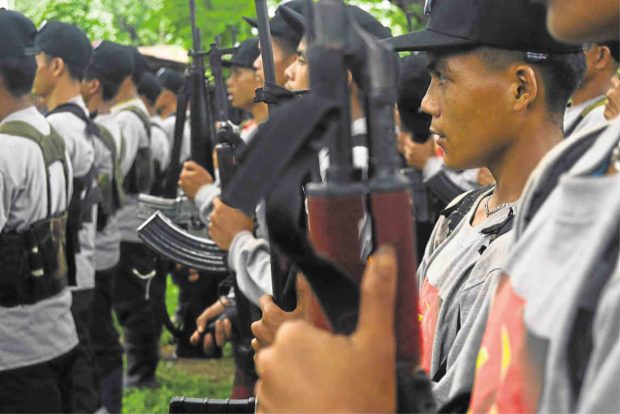Hope seen in local talks with Reds

In this photo taken in December last year, New People’s Army rebels in North Central Mindanao region gather to mark the Communist Party of the Philippines’ 48th anniversary. JIGGER JERUSALEM
Despite the cancellation of peace negotiations between the government and the National Democratic Front of the Philippines (NDFP), local officials remained hopeful that peace would be attained through community-based dialogues with communist rebels.
In Davao City, Mayor Sara Duterte, daughter of President Duterte, said localized peace talks would not conflict with her father’s cancellation of talks with the NDFP.
According to Mayor Duterte, she will continue reaching out to rebels in the city until Malacañang formally declares the New People’s Army (NPA) a terror group.
“We already checked with the Office of the Executive Secretary but so far, they have not released an official document [declaring the NPA as a terror group],” she said.
In North Cotabato province, Gov. Emmylou Taliño-Mendoza said she was planning to conduct localized talks with rebels who, in recent months, conducted raids in her province.
Mendoza, in a text message, said the cancellation of the talks would not “deter us from pushing with our local peace initiatives.”
“The need to advance the agenda for a sustainable and just peace in the province remains a priority,” Mendoza said.
Civilians to suffer
“The road to achieving peace is not easy. But there would be greater negative impact on the people … if we totally abandon the idea of pursuing peace even at our level at this time,” Mendoza added.
Anakpawis Rep. Ariel Casilao agreed that civilians would bear the brunt of the talks’ cancellation.
“The main agenda of the (next level of the) peace talks is the Comprehensive Agreement on Socio-Economic Reform, which addresses the root cause of armed rebellion in the country, borne out of landlessness among the majority of the population,” Casilao said.
Bayan Muna Rep. Carlos Isagani Zarate said escalating clashes should have prompted negotiators from both sides to continue the peace process, instead of ending it.
“That is precisely why peace talks must proceed because the two sides are at war,” he told the Inquirer.
The NDFP Reciprocal Working Committee on Social and Economic Reforms (RWC-SER) said it viewed with grave concern President Duterte’s “sudden turnabout and unilateral cancellation of the talks.”
Zones of peace
In Quezon province, officials said engaging communist rebels in localized talks would create “zones of peace” that would protect communities.
Leovigildo Rozul, former mayor and now administrator of General Nakar town, said concerned citizens and multisectoral groups should continue to strive for peace amid the government’s decision to stop talking with the NDFP.
“If we can convince both armed protagonists, through localized peace talks, to respect our respective localities as zones of peace, meaning, they should not turn our place into a battlefield, it is already a victory for peace,” Rozul said.
In 2007, indigenous peoples’ communities, residents and officials of Real, Infanta and General Nakar towns declared their communities as zones of peace to protect them from clashes between government troops and communist rebels.
The call, however, was ignored as clashes continued in the Sierra Madre section of northern Quezon, disrupting residents’ activities and livelihoods.
While the military supported the initiative of local governments and multisectoral groups, Maj. Gen. Rhoderick Parayno, commander of the Army’s 2nd Infantry Division, said the military would not actively participate in these negotiations.
“We will remain on the sidelines. We will only come into the picture if there are issues concerning the military,” he said.
Brig. Gen. Ernesto Ravina Jr., deputy commander of the military’s Southern Luzon Command, said his command would continue to support peace talks through the local peace and order councils in the region. —REPORTS FROM ALLAN NAWAL, JOSELLE BADILLA AND DELFIN T. MALLARI JR.